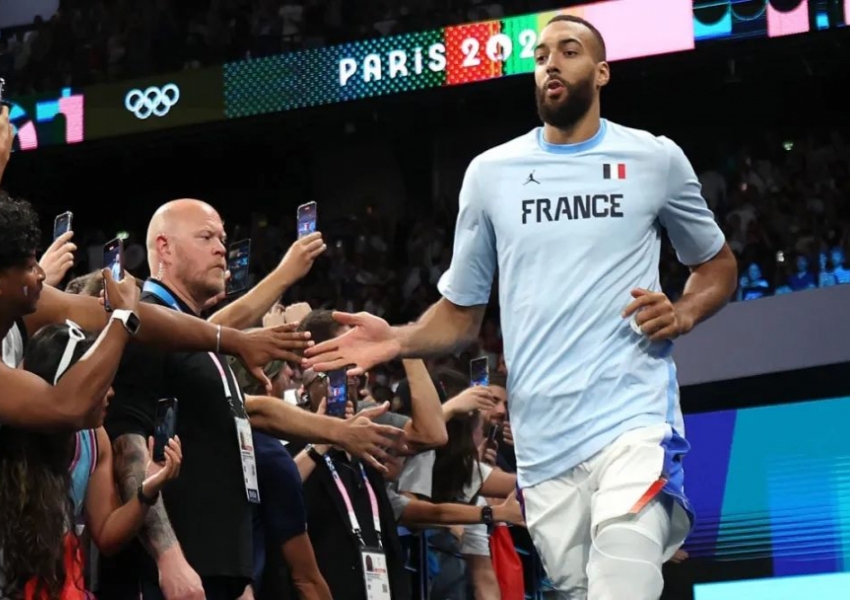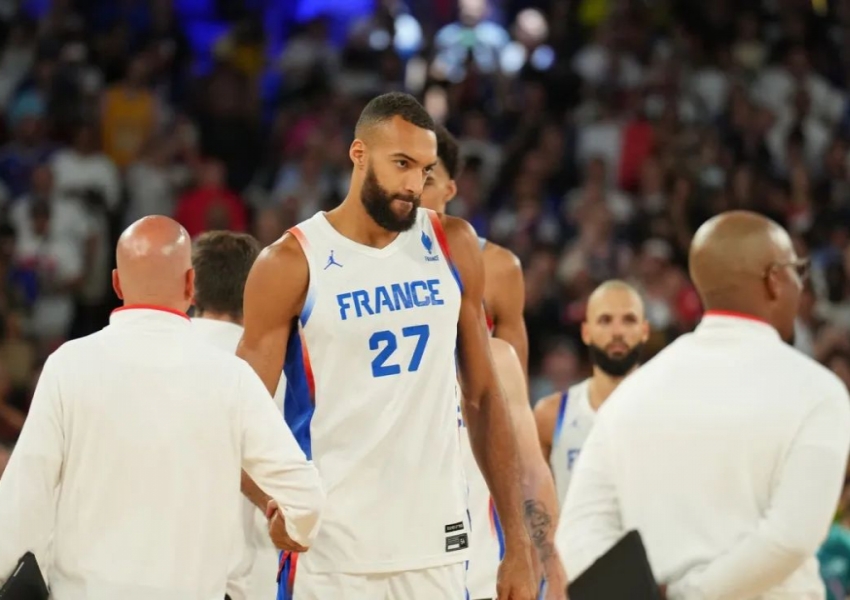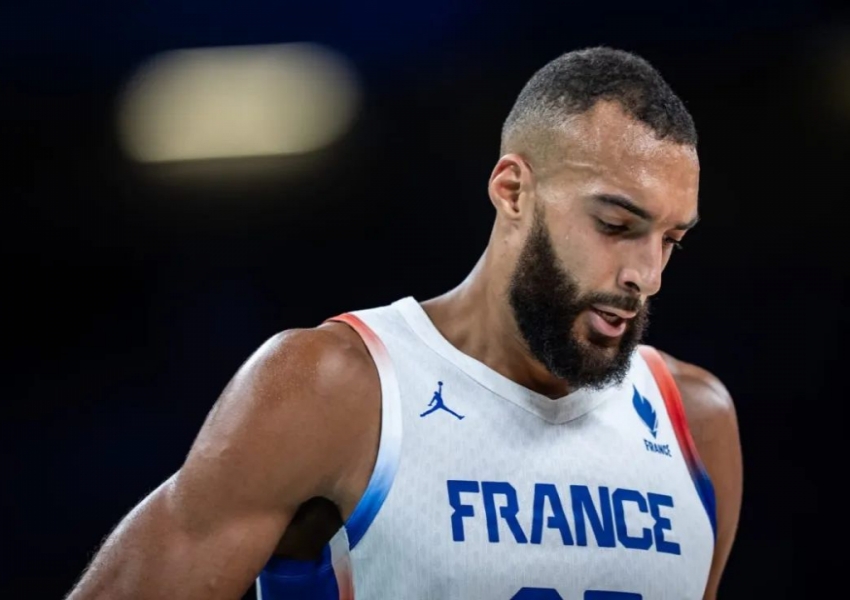How Embarrassing! Has Gobert’s Stock Plummeted After This Olympics?
The Paris Olympics have come to an end, and while the host nation France didn’t clinch the gold medal in men’s basketball, their silver finish was nothing to scoff at. The French team pushed their opponents to the brink in the finals, only succumbing after a late surge by Stephen Curry, which speaks volumes about their resilience and skill. One of the brightest spots for France was the performance of 20-year-old sensation Victor Wembanyama, who, in his first Olympic appearance, averaged 15.8 points, 9.7 rebounds, and 3.3 assists over six games—leading the team in all three categories.

However, while Wembanyama’s star was on the rise, another French player saw his stock plummet—Rudy Gobert. Despite being a four-time NBA Defensive Player of the Year and fresh off helping the Minnesota Timberwolves reach the Western Conference Finals for the first time in 20 years, Gobert’s role in this tournament was drastically reduced, leaving many to question his future value both in the NBA and on the international stage.

During the group stage, Gobert was still considered a cornerstone of the French team, starting all three games and averaging 6.0 points, 6.3 rebounds, and 2.7 blocks in 21 minutes per game with a shooting percentage of 72.3%. But as the competition intensified in the knockout rounds, Gobert’s role shrank dramatically. In three crucial games—against Canada in the quarterfinals, Germany in the semifinals, and the United States in the final—Gobert saw his minutes dwindle to a mere 21 minutes combined, contributing just 2 points, 5 rebounds, and 2 assists across all three games.

This sudden drop in playing time was shocking, given that Gobert has been one of France’s most prominent players. Just two years earlier, during the Tokyo Olympics, Gobert had been instrumental in helping France secure the silver medal, averaging 12.2 points and 9.3 rebounds per game, including a standout 22-point, 9-rebound performance against Italy and a 14-point, 9-rebound game in the final against Team USA. Back then, Gobert was a key figure on the court, even finishing that gold-medal game with a +4 plus-minus rating despite the loss.
So what happened? How did Gobert go from being an indispensable force to a benchwarmer in the span of one Olympic cycle? The answer seems to lie in a combination of tactical adjustments by the French coaching staff and Gobert’s own limitations on the court.
French head coach Vincent Collet made the bold decision to shift away from relying heavily on Gobert as the tournament progressed. After struggling through a tough group stage where they narrowly escaped an upset by Japan, Collet opted to prioritize a smaller, more versatile lineup in the knockout rounds. This adjustment meant moving Wembanyama to the center position and utilizing Guerschon Yabusele as a stretch four. The strategy paid off, as France went on to upset both the second-seeded Canadian team and the third-seeded German team, before narrowly falling to the U.S. in the final.
The change in Gobert’s role was stark, and perhaps most embarrassing was his minimal contribution in the final against an all-NBA Team USA roster. Despite what seemed like an ideal matchup for Gobert to showcase his defensive prowess, he logged just 11 minutes on the court. To add insult to injury, one particularly awkward moment saw Gobert tumble while defending Joel Embiid, leading to a somewhat inappropriate scene that quickly became fodder for jokes on social media. NBA personalities like Draymond Green and Shaquille O’Neal wasted no time in mocking the incident, with Shaq even posting the clip online, quipping, “What kind of move is this?”
The public ridicule only added to the growing narrative that Gobert, while still an elite defender under specific conditions, has significant limitations that can be exploited at the highest levels of competition. His offensive game remains heavily reliant on others creating scoring opportunities for him, and his presence can often congest spacing, making it easier for opposing defenses to collapse inside. In high-stakes matchups, especially against teams with versatile perimeter players like Luka Dončić or Kyrie Irving, Gobert’s mobility on defense has been exposed, with opposing teams frequently targeting him in switch situations.
Even before the Olympics, Gobert had faced criticism following the Timberwolves’ playoff run, where his impact was questioned despite Minnesota’s success. Myles Turner of the Indiana Pacers recently weighed in on Gobert’s game, pointing out that while his presence can deter opponents from attacking the rim, his vulnerability in perimeter defense makes him a liability in certain matchups. Turner’s comments reflect a broader sentiment that while Gobert’s strengths are undeniable, his weaknesses are just as glaring, especially in a league that increasingly values versatility over specialization.
Gobert’s reduced role in the Olympics, coupled with France’s unexpected success in his absence, has only fueled these concerns. The French team’s deep run without heavily relying on Gobert raises uncomfortable questions about his future role, both internationally and in the NBA. Could we be witnessing the beginning of the end for Gobert as a top-tier player? Or was this merely a tactical decision by France that shouldn’t overshadow his overall value?
One thing is certain: Gobert’s reputation has taken a hit. It’s one thing to struggle in the NBA, where the level of competition is the highest in the world, but to see your role diminished on the international stage, especially in front of a home crowd, is something else entirely. For Gobert, who has long been a proud representative of French basketball, this Olympic experience must feel like a nightmare—a scenario where, instead of shining brightly on one of the world’s biggest stages, he found himself on the sidelines as his team surged without him.
As the dust settles from the Paris Olympics, Gobert now faces an uncertain future. Will NBA teams view him as a defensive anchor worth building around, or will his stock continue to fall as the league evolves away from traditional big men? Only time will tell, but one thing is clear: this summer was not the redemption arc Rudy Gobert had hoped for. Instead, it may have marked the beginning of a new chapter in his career—one where he must fight to reclaim the respect and status he once commanded.
Copyright Statement:
Author: focusnba
Source: FocusNBA
The copyright of this article belongs to the author. Reproduction is not allowed without permission.
Recommended Blog
- No! Tatum’s Public Feud Unravels Team USA: A New Era of Chaos
- Guangdong Tigers Make a Bold Move: Signing Former Nuggets Core Player Will Barton Amidst a Wild CBA Offseason
- Farewell to Jokic: 11 Assists, 0 Turnovers, and a Bronze Medal – The Best Basketball Player in the World
- A Global Humiliation: Tatum's Parents Voice Outrage – Why Was He Benched?
- Team USA's Big Decision: Goodbye, Wembanyama! The MVP Race is Heating Up
- Joel Embiid's Possible Exit from Team USA: The NBA MVP's Next Big Battle
- A Class Above the Rest: How Dominant is Jokic at the Olympics?
- It's Official! Cui Yongxi and the NBA: A Testament to the Chinese Basketball Association’s Supportive Spirit
- $200 Million Extension? Nuggets Should Trade Fast! The Second Star Won’t Help Westbrook Win a Championship...
- Explosive! Officially Rated a Four-Star Recruit in the U.S.! The Only Chinese Forward with NBA Potential...